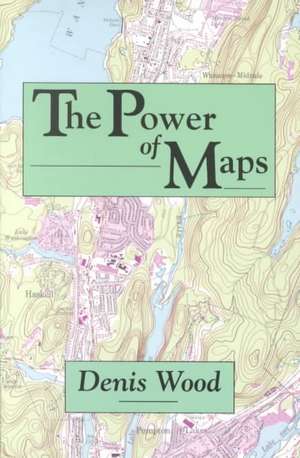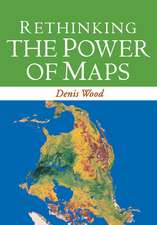The Power of Maps: Mappings: Society/Theory/Space
Autor Denis Wooden Limba Engleză Paperback – 31 dec 1992
Preț: 199.12 lei
Nou
38.10€ • 39.78$ • 31.53£
Carte tipărită la comandă
Livrare economică 04-18 aprilie
Specificații
ISBN-10: 0898624932
Pagini: 248
Ilustrații: b&w illustrations, maps
Dimensiuni: 152 x 229 x 18 mm
Greutate: 0.38 kg
Ediția:Revised
Editura: Guilford Publications
Colecția Guilford Press
Seria Mappings: Society/Theory/Space
Public țintă
Professional Practice & Development and UndergraduateNotă biografică
Recenzii
Combining both topical issues relevant to lay readers and serious scholarship, Denis Wood's The Power of Maps will provoke, amuse, tweak, and inform anyone who has had occasion to use, or merely peruse, a map--which is to say, everyone. It is a relentless entertainment--relentlessly challenging to traditional assumptions about cartography, relentlessly witty as it deconstructs (read: demolishes) the pretense of neutral, `scientific' map-making, and relentlessly contrary in reminding us that maps reflect social choices and serve particular political interests.'' --Stephen S. Hall, author of Mapping the Next Millennium
Perhaps the simplest thing to say is that there is nothing quite like it! There are, of course, countless conventional accounts of cartography -- usually a combination of the history of cartography and a catalogue of its technical achievements-- but these are usually Whiggish tales which celebrate the progressive advance of cartography towards 'Truth.' Apart from a short discussion of so-called 'propaganda maps' (which is there simply to mark a departure from the norm, so to speak, an anomaly) these books rarely offer any sustained discussion of what one might call the cultural and political implications of maps and mapping. With the current explosion of interest in cultural politics and social theory, both inside and outside human geography, there is an obvious need for a discussion which resists those conventions. I can think of only Mark Monmonier's HOW TO LIE WITH MAPS -- which from all accounts has done extremely well, but is narrower in scope than Wood's text -- and the late Brian Harley's marvelous essays on deconstruction and mapping -- which may well be too abstract for many readers. In any event, I have no doubt that Denis Wood's book will be a major contribution to this emerging discussion of the power and politics of maps and mapping: it is written in a clear and accessible style but none the less deals with some of the most complex issues in contemporary debates over power, knowledge and spatiality. It is immensely engaging: the examples and illustrations are to the point and by no means obvious, and the issues that are raised extend far beyond the confines of any purely academic discipline. This is one of those rare books that will prompt its readers to re-think some of their most taken-for-granted assumptions and the ways in which those conventions bear on their everyday lives.-- Derek Gregory, The University of British Columbia
"If compelled to cite only a single book on cartography to stock a desert-island shelf or to assign to the eager novice, this is the automatic choice....Although I have been drawing and poring over maps, as well as reading about them, since childhood, I received more revelations about their essential nature and larger meanings from this one powerful, disturbing, totally convincing essay than from all the other books, articles, and lectures on the subject I have ever encountered.' --Wilbur Zelinsky, The Pennsylvania State University "Combining both topical issues relevant to lay readers and serious scholarship, Denis Wood's "The Power of Maps" will provoke, amuse, tweak, and inform anyone who has had occasion to use, or merely peruse, a map--which is to say, everyone. It is a relentless entertainment--relentlessly challenging to traditional assumptions about cartography, relentlessly witty as it deconstructs (read: demolishes) the pretense of neutral, scientific' map-making, and relentlessly contrary in reminding us that maps reflect social choices and serve particular political interests.' --Stephen S. Hall, author of "Mapping the Next Millennium" "Perhaps the simplest thing to say is that there is nothing quite like it! There are, of course, countless conventional accounts of cartography -- usually a combination of the history of cartography and a catalogue of its technical achievements-- but these are usually Whiggish tales which celebrate the progressive advance of cartography towards 'Truth.' Apart from a short discussion of so-called 'propaganda maps' (which is there simply to mark a departure from the norm, so to speak, an anomaly) these books rarely offer any sustained discussion of what one might call the cultural and political implications of maps and mapping. With the current explosion of interest in cultural politics and social theory, both inside and outside human geography, there is an obvious need for a discussion which resists those conv
Descriere
This volume ventures into terrain where even the most sophisticated map fails to lead--through the mapmaker's bias. Denis Wood shows how maps are not impartial reference objects, but rather instruments of communication, persuasion, and power. Like paintings, they express a point of view.
By connecting us to a reality that could not exist in the absence of maps--a world of property lines and voting rights, taxation districts and enterprise zones--they embody and project the interests of their creators. Sampling the scope of maps available today, illustrations include Peter Gould's AIDS map, Tom Van Sant's map of the earth, U.S. Geological Survey maps, and a child's drawing of the world.
THE POWER OF MAPS was published in conjunction with an exhibition at the Cooper Hewitt Museum, the Smithsonian Institution's National Museum of Design.
















